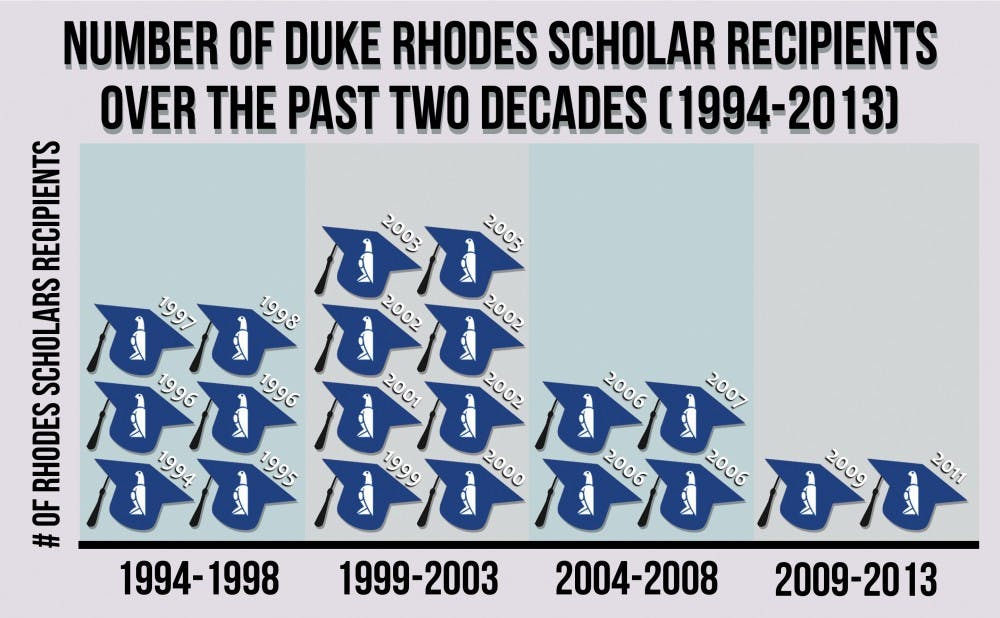Forty Duke students have been awarded prestigious Rhodes Scholarships over the years, but the past decade has seen fewer Duke Rhodes Scholars than the previous decade.
Duke had one Rhodes Scholarship recipient each year from 1994 to 2003 and had three in 2002. In the 12 years following, however, Duke has had six scholars—with none winning in the past three years, making this the longest that Duke has gone without having a Rhodes Scholar since 1978. The Rhodes Trust, founded in honor of businessman and colonialist Cecil Rhodes in 1904, selects 32 American students each year and pays for them to continue their studies for the following two or three years at Oxford University, England.
Melissa Malouf, director of Duke's Office of Undergraduate Scholars and Fellows, said that Rhodes winners are simply unpredictable, and does not see Duke’s lack of a winner in recent years as indicative of the quality of the students applying.
“I can recall even 15 or more years ago a Rhodes advisor telling students that applying was ‘a crap shoot,’” Malouf said. “I’d put it a bit more positively and call it a ‘hail Mary pass,’ which is always better than no pass at all.”
Each year Duke’s number of applicants has remained consistently between 10 and 12 and has not experienced a significant decline in recent years, said Barbara Wise, associate director of OUSF .
Rhodes applications have stayed constant on a national scale, said Elliot Gerson, American Secretary for the Rhodes Trust. The number of students applying for the scholarship has remained steadily around 2000, with 800 to 900 applicants being endorsed by their university or college. Of those endorsed for the scholarship, Gerson said 200 are chosen for interviews, and, ultimately, 32 finalists are selected on the basis of high academic achievement, leadership qualities, physical vigor and person integrity.
Despite the fact the there are certain universities that consistently have more Rhodes winners than others, Gerson maintains that students experience neither an advantage nor a disadvantage on the basis of their institution.
“The Rhodes Scholarship seeks individuals. Individuals compete, not universities,” Gerson said. “It’s not surprising that there are more winners from highly competitive universities, or universities that are highly selective in terms of who gets in, so some institutions might have disproportionate success in our competition, but we give no weight whatsoever to people based on where they go to.”
Jared Dunnmon, Pratt '11 and Duke’s most recent Rhodes Scholar, said that he does not think the name of one’s institution offers intrinsic advantages or disadvantages. He did note, however, that his experience at Duke helped him because it provided him with opportunities to study a variety of disciplines and learn from accomplished mentors.
“I had some really fantastic mentors who took a lot of time showing me the ropes and helping me think about what questions really mattered to me,” Dunnmon said. “I did a lot of my self-discernment both in and outside the classroom, so I think that was the most important thing regarding [Duke]—I didn’t get lost at Duke in the crowd.”
Dunnmon added that he originally intended to apply for the Marshall Scholarship rather than the Rhodes, because he sought funding for his Ph.D., but the staff at OUSF suggested he apply for the Rhodes as well.
Malouf said that although the University has not experienced an unusual decline in its number of applicants, it would like more students to apply.
“The application process is well worth going through,” Malouf said. “[It] is an excellent opportunity for students to think and write about their academic and career trajectories.”
Two years ago Duke added a communications staff to OUSF to help students learn more about the scholarship applications and the process, Wise added.
Dunnmon said that Duke’s internal application process for the scholarship was extremely beneficial in helping him have a clearer idea of what he wants to do with his life.
“I entered that process kind of knowing what I wanted to work on, but I hadn’t really boiled it down to a career path yet,” Dunnmon said. “I certainly haven’t yet, but even though I don’t know exactly what I want to do from a career standpoint, I have some ideas, and more importantly, I can tell you what impact I want to have—it’s just a matter of how I go about doing that.”
Get The Chronicle straight to your inbox
Signup for our weekly newsletter. Cancel at any time.

